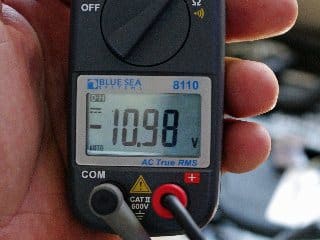
dc ground fault_4390.jpg
First, let me apologize for not posting since last week. I’ve been traveling and really tied up with meetings and such. But I’m back at it.
We received a scary message from one of our readers several days ago, and I need to share this because it is illustrating a super dangerous situation that you all need to know about.
First of all, the reader bought one of the reference cells I mentioned in my July 8th post. So, as all people curious about such things would do, he decided to check out his own boat. The reading on his meter is shown here:

So, you may ask what is our friend reading here? The electrode he purchased is in the water next to his boat and the other meter lead is connected to the boat’s ground. It looks like the meter leads are actually hooked up backwards, but all that affects is the plus minus reading on the meter. To check for corrosion potential you would normally put the electrode lead in the meter’s “com” socket and the + lead would be connected to the grounding bus or a really good ground on the boat. (that’s with a digital meter like the one above). With an old style analogue meter you would do the opposite with the leads.
Anyhow, what this person is reading right now is a really, really big DC ground fault on thier boat that is entering the water around the boat. (The meter is set to the DC volts scale.) Yup, the boat is dumping almost 11 volts DC into the water around the boat. It has not blown a fuse or circuit breaker because there must not be enough amperage flowing to do so. Not an uncommon thing to occur.
Now, what this means is that if left unattended for more than about 24 hours some serious damage can occur to his boat and any boats near him in the marina.
What to do? I’d disconnect the battery(s) on this boat until an electrician can isolate the ground fault. I’ve seen this level of leakage destroy things like bow thruster drive legs in less that two days.







